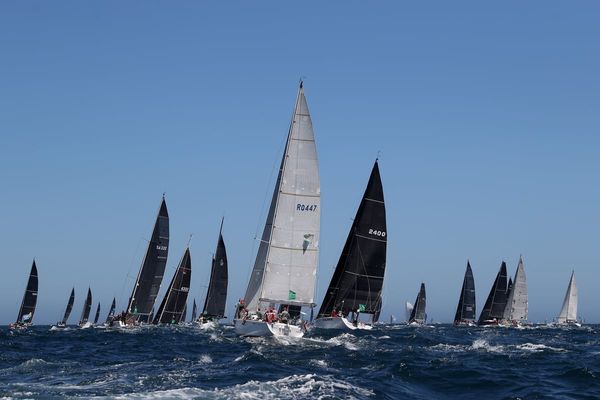
In his annual threat assessment speech late last month, ASIO boss Mike Burgess regaled his audience with details — à la John le Carré — of how an active and extensive espionage team from an unnamed foreign country had been operating in Australia.
A few days after Burgess’ riveting spy report, a Sydney Morning Herald story told us that, “while Burgess repeatedly refused to name any overseas intelligence agency”, the masthead had independently confirmed that China was the “country behind [the] spy chief’s unnamed ‘A-team’”.
The Herald’s story also mentioned a visit to China by Australian journalists and others, at the invitation of the Ministry of State Security. In response, Crikey’s Bernard Keane, one of the invited journalists, was puzzled by the article’s suggestion that anyone who joined the tour had risked being “turned” by China. Keane was clearly unimpressed with the security establishment’s heavy investment in “peddling a self-serving narrative” of security threats. And he seemed equally unimpressed with “journalists who readily swallow its spin”.
While echoing Keane’s concern, Paul Keating is more cynical. With his characteristic sarcasm, Keating observed: “Burgess drops the claim, then out of nowhere, the Herald and The Age miraculously appear to solve the mystery”. In other words, Keating doesn’t believe the SMH story was based on an independent source; he seems to imply the newspaper obtained its information directly from ASIO.
If Keating is a sceptic, he is not the only one. A couple of years back, veteran journalist Hamish McDonald, discussing ASIO’s raid of a NSW Labor MP who was suspected of having links to China, observed wistfully: “The Age investigative reporter Nick McKenzie, who has led the hunt for united front operatives, just happened to be outside [the MP’s] home at 6.30am along with a crew from Nine’s 60 Minutes as the raid occurred.”
Which of these scenarios is most likely: credulous journalists willing to accept the spin; our media toeing the security establishment’s line; the two parties — the media and security agencies — working hand in glove; leaks originating from outside the security agencies but close enough to have inside information? Or is it a case of intrepid investigative journalists daring to defy ASIO and independently uncovering the truth, when Burgess and his team genuinely want to conceal the identity of the foreign country on national security grounds?
We may never know. But one way or another, the optics suggest a cosy relationship between some mainstream media and our security institutions. Keane believes good journalism should first and foremost serve the public interest, and function as a vigilant “watchdog” on behalf of the public. So he finds it problematic when journalists “fall into line with the security establishment”. Importantly, Keane considers McKenzie, the author of the Herald article mentioned earlier, to be the best journalist in the country, alongside Kate McClymont.
Two things warrant further elaboration about why this relationship is problematic. First, by “falling into line” with the security establishment, journalists, with rare exceptions, tend to turn a blind eye to the political motives, institutional agenda, professional machinations and integrity of those they rely on for access.
Second, this cosy relationship is particularly troubling given that some of these award-winning journalists have a stellar reputation for their domestic reporting, so audiences may not question their judgement or doubt the quality of their reporting in other areas. Consequently, while they continue to be appropriately lauded for their fine reporting of domestic affairs, they go largely unchallenged for any problems in their reporting on external actors.
For instance, despite the flurry of stories about spy Wang Liqiang in Nine’s papers and other media, Wang turned out to be a spy-wannabe who was apparently using these media outlets to speed up his visa application process. This fake spy saga prompted China researcher David Brophy to lament the absence of media accountability “when China-related stories like this come unstuck”.
We increasingly face a paradoxical scenario: some of our best journalists seem to check their trademark journalistic instincts at the door when it comes to dealing with the security and intelligence bureaucracies.
What we see is the curious display — often coexisting within one journalist and in one media institution — of “watch dog” and “guard dog” models of journalism. The former believes that journalism should function as the fourth estate — the watch dog — reporting without fear and favour and speaking truth to power. Acting in this mode, our journalists interrogate the prime minister, the ministers, the church and the big end of the town. For instance we see the best of such journalism in some of the ABC’s Four Corners programs.
In the guard dog model, however, the media function as sentries for our security agencies, whose task is to keep an eye on hostile foreign forces with nefarious intentions. The guard dog is certainly also vigilant, but its focus is only on what our security agencies perceive to be national security threats.
The Saturday Paper’s founding editor Erik Jensen once observed that journalists are sceptical about — and therefore eager to pursue — anything they can’t see, especially when what they can’t see is powerful. This insight is useful in understanding why China presents itself as an irresistible hunting target to ambitious journalists. After all, China is not a liberal democracy, and much of the Chinese government’s political thinking and policy-making is not transparent to the Chinese media and public, let alone those outside China. So its secrecy and censorship give succour to, rather than discourage, distrust and suspicion.
For journalists eager to uncover the covert actions of this threatening foreign power, the security and intelligence establishments become trustworthy collaborators. Functioning as a guard dog for security institutions has led to the regular practice of “access journalism”, a kind of reporting in which the journalist willingly or unwittingly plays the role of mouthpiece. The journalist appears to have “exclusive access” to undisclosed “credible” and “reliable” sources. Access journalism has a number of features: its sources often cannot be named; evidence is often not presented; any evidence cited cannot be independently verified; and it uses vague and suggestive words (e.g. “is linked to”). Finally, access journalism often bears the hallmark of Cold War journalism, usually practised when the threat of an external national enemy seems real and imminent.
Just as the old Cold War perspective imagined the world to be a binary between the Soviet Union and the West, the new Cold War framework replaces the Soviet Union with China. Our mainstream media are in the grip of this geopolitical image. As Yun Jiang observes astutely, “In much of the media reporting in Australia, the world comprises only three countries — China, Australia and the US — fighting over Taiwan”. Many of our journalists, including those with impressive domestic reporting track records, seem unwilling or unable to go beyond this binary, simplistic view of the world. Our mainstream media has not merely reported on the ups and downs in the Australia–China relationship; it has actively contributed to what some commentators call the “securitisation” of Australia’s public discourse.
And for the media, especially mainstream commercial outlets struggling to survive, no stories sell better than those about spies and traitors, and the clandestine activities of our hostile foreign bête noire du jour. Working in this space, stories that manage to “reveal” the invisible and “uncover” the hidden therefore tick two boxes: driving readership traffic and seemingly embodying “fearless” journalism.
Geopolitics and market logic determine that such a Cold War mindset will become more entrenched in the journalism of our mainstream media in the near future. Perhaps the best audiences can do is to come to terms with one simple fact: most of our journalism, despite the oft-touted ideals of objectivity and truth-seeking, is in fact a product of its time. The stories journalists write are thus an integral part of the dominant geopolitical narrative, not apart from it.
Are you concerned about the rise of access journalism? How should the media report on China? Let us know your thoughts by writing to letters@crikey.com.au. Please include your full name to be considered for publication. We reserve the right to edit for length and clarity.







